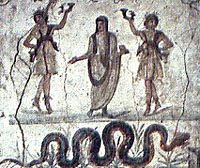Hello Poets,
Few ask as compelling questions as Kay Ryan. Here's one on the endless passings, big, blue and deep.
Best,
Sam
Tune
Imagine a sea
of ultramarine
suspending a
million jellyfish
as soft as moons.
Imagine the
interlocking uninsistent
tunes of drifting things.
This is the deep machine
that powers the lamps
of dreams and accounts
for their bluish tint.
How can something
so grand and serene
vanish again and again
without a hint?
by Kay Ryan, from The Niagara River, 2005
Monday, June 28, 2010
Monday, June 21, 2010
Cottonmouth Country, Louise Gluck
Hello Poets,
As yet no poems lament the death and destruction on-going in the Gulf. No poems illuminate the oily mysteries of life and death in deep water. Now isn't NYC post 9-11 when poems where taped to lamp posts.
This poem, from Louise Gluck's first book of poetry, may point the way.
Best,
Sam
Cottonmouth Country
Fish bones walked the waves off Hatteras.
And there were other signs
That Death wooed us, by water, wooed us
By land: among the pines
An uncurled cottonmouth that rolled on moss
Reared in the polluted air.
Birth, not death, is the hard loss.
I know. I also left a skin there.
by Louise Gluck, from The First Four Books of Poems, 1995
As yet no poems lament the death and destruction on-going in the Gulf. No poems illuminate the oily mysteries of life and death in deep water. Now isn't NYC post 9-11 when poems where taped to lamp posts.
This poem, from Louise Gluck's first book of poetry, may point the way.
Best,
Sam
Cottonmouth Country
Fish bones walked the waves off Hatteras.
And there were other signs
That Death wooed us, by water, wooed us
By land: among the pines
An uncurled cottonmouth that rolled on moss
Reared in the polluted air.
Birth, not death, is the hard loss.
I know. I also left a skin there.
by Louise Gluck, from The First Four Books of Poems, 1995
Thursday, June 17, 2010
'Dust' by Dorianne Laux
Dust
Someone spoke to me last night,
told me the truth. Just a few words,
but I recognized it.
I knew I should make myself get up,
write it down, but it was late,
and I was exhausted from working
all day in the garden, moving rocks.
Now, I remember only the flavor -
not like food, sweet or sharp.
More like fine powder, like dust.
And I wasn’t elated or frightened,
but simply rapt, aware.
That’s how it is sometimes -
God comes to your window,
all bright light and black wings,
and you’re just too tired to open it.
by Dorianne Laux, from What We Carry, 1994
Monday, June 7, 2010
Rebus by Jane Hirshfield
Hello Poets,
Jane Hirshfield works life's damp clay, taking up our many shortcomings, piecing together its colors and tastes, seeking out its obscure language with a question.
A rebus is one those puzzles in which words are represented by pictures and letters.
Best,
Sam
Rebus
You work with what you are given,
the red clay of grief,
the black clay of stubbornness going on after.
Clay that tastes of care or carelessness,
clay that smells of the bottoms of rivers or dust.
Each thought is a life you have lived or failed to live,
each word is a dish you have eaten or left on the table.
There are honeys so bitter
no one would willingly choose to take them.
The clay takes them: honey of weariness, honey of vanity,
honey of cruelty, fear.
This rebus- slip and stubbornness,
bottom of river, my own consumed life-
when will I learn to read it
plainly, slowly, uncolored by hope or desire?
Not to understand it, only to see.
As water given sugar sweetens, given salt grows salty,
we become our choices.
Each yes, each no continues,
this one a ladder, that one an anvil or cup.
The ladder leans into its darkness.
The anvil leans into its silence.
The cup sits empty.
How can I enter this question the clay has asked?
by Jane Hirshfield, from Given Salt, Given Sugar, 2001
Jane Hirshfield works life's damp clay, taking up our many shortcomings, piecing together its colors and tastes, seeking out its obscure language with a question.
A rebus is one those puzzles in which words are represented by pictures and letters.
Best,
Sam
Rebus
You work with what you are given,
the red clay of grief,
the black clay of stubbornness going on after.
Clay that tastes of care or carelessness,
clay that smells of the bottoms of rivers or dust.
Each thought is a life you have lived or failed to live,
each word is a dish you have eaten or left on the table.
There are honeys so bitter
no one would willingly choose to take them.
The clay takes them: honey of weariness, honey of vanity,
honey of cruelty, fear.
This rebus- slip and stubbornness,
bottom of river, my own consumed life-
when will I learn to read it
plainly, slowly, uncolored by hope or desire?
Not to understand it, only to see.
As water given sugar sweetens, given salt grows salty,
we become our choices.
Each yes, each no continues,
this one a ladder, that one an anvil or cup.
The ladder leans into its darkness.
The anvil leans into its silence.
The cup sits empty.
How can I enter this question the clay has asked?
by Jane Hirshfield, from Given Salt, Given Sugar, 2001
Subscribe to:
Posts (Atom)

